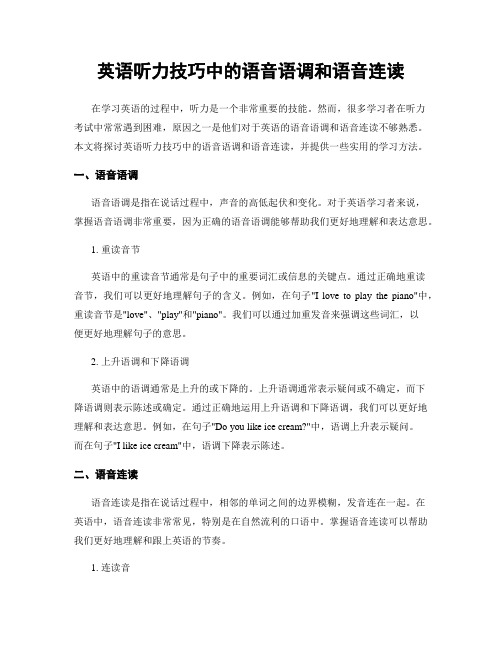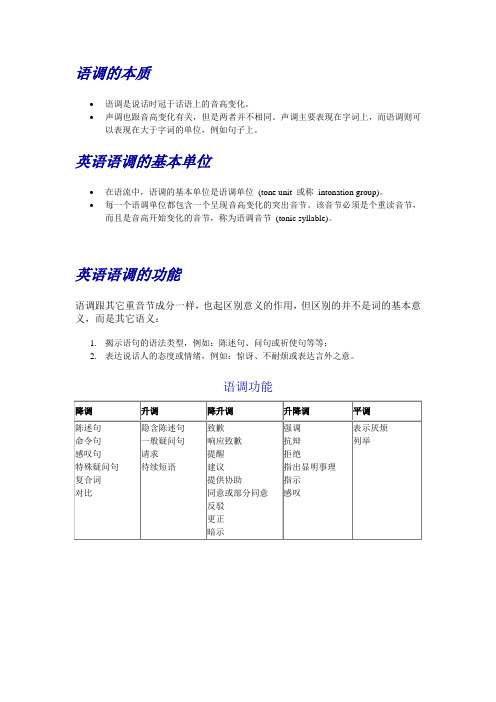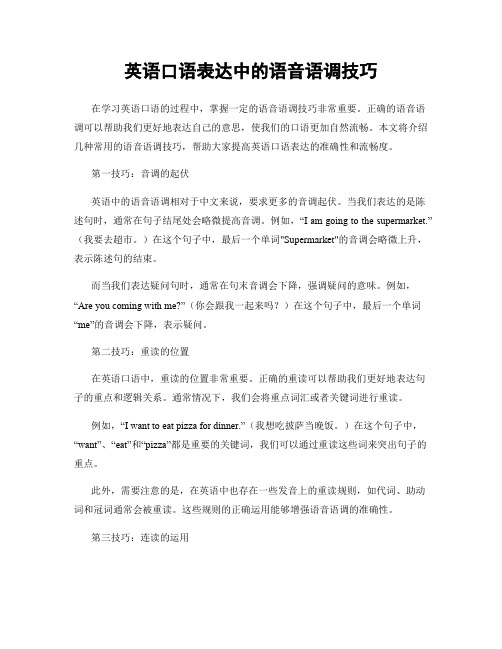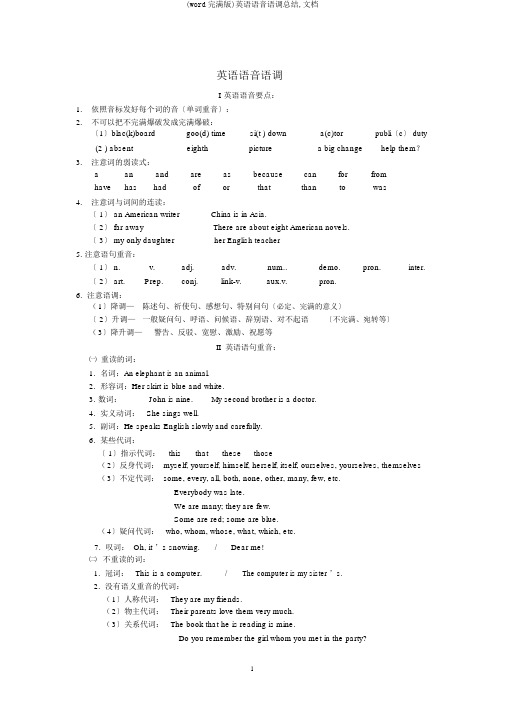英语语音语调总结
英语语音语调与变音规律

英语语音语调与变音规律英语语音语调与变音规律是学习英语语音和发音的重要内容,掌握好这些规律能够帮助我们更准确地表达和理解英语,提高交流的效果。
本文将从语音语调和变音规律两个方面进行探讨。
一、英语语音语调1. 语音强调英语中,语音强调是一种通过改变发音重音位置实现的语气调整方式。
通常,我们将句子中的重点单词或信息进行强调,来表达情感、强调重要性或对比等。
强调的方式主要有以下几种:(1) 通过语音音调的变化:通过改变音调,特别是重音音调的高低变化来强调单词或短语。
(2) 通过音量的变化:通过改变发音的音量,使强调的单词或短语的音量较大,其他部分较小。
2. 语音抑扬顿挫英语语音抑扬顿挫是指语音的上升和下降,在口语交流和语音语调中起着很重要的作用。
常见的语音抑扬顿挫有:(1) 上升语调:表示疑问、不确定或请求等,以及一些陈述句中的问题;(2) 下降语调:表示陈述、肯定、命令等。
二、英语变音规律1. 声调变化在英语中,有些单词的发音会因为其词性的变化而发生变化。
主要表现在以下几个方面:(1) 名词和动词的发音:名词一般为双音节、重音在第一个音节上,而动词一般为单音节、重音在第二个音节上,因此在发音上会有所区别;(2) 复数形式的变化:在英语中,名词的复数形式通常在词尾加上-s或-es,这样在发音上会有细微的变化;(3) 时态的变化:动词的时态变化也会导致发音的变化,例如动词的过去式变化通常在词尾加上-ed。
2. 连读现象英语中的连读是一种很常见的发音规律,它指的是在词与词之间的连读现象。
主要有以下几种情况:(1) 辅音和元音连读:当一个词以辅音结尾,下一个词以元音开头时,通常会发生连读现象;(2) 元音和元音连读:当一个词以元音结尾,下一个词又以元音开头时,通常会发生连读现象;(3) 辅音和辅音连读:当一个词以辅音结尾,下一个词以辅音开头时,通常会发生辅音的连读现象。
通过掌握英语语音语调和变音规律,我们能够更准确地表达和理解英语,提高交流的效果,并且更好地适应英语的语音语调和变音的规律。
英语的语调规律顺口溜

英语的语调规律顺口溜英语的语调是指语音的音高起伏和变化规律,是语言交际中重要的组成部分。
学习英语的语调规律有助于提高口语表达的准确性和流畅性。
下面是一首顺口溜,帮助我们记住英语的语调规律。
英语说话注意调音法,语调规律要掌握。
降调起始向下走,逐步下降变为连读。
上升调是向上走,逐步上升有高有低。
折线调有低有高,声音起伏不断改。
终辅音做尾音,语调上升变调宜。
英语语调不容忽视,学好语音就要用心。
这首顺口溜帮助我们记住了英语的语调规律。
下面我们来具体分析一下每一句的内容:1. "英语说话注意调音法" - 这句话指出在说英语的时候要注意语调,即语音的音高起伏和变化规律。
语调是英语中非常重要的一部分,它能够帮助我们传达更准确的意思。
2. "降调起始向下走,逐步下降变为连读" - 这句话提到了降调,降调是指音高由高到低逐步下降的语调。
在英语中,降调常常发生在句子最后,表示陈述、命令等,同时也伴随着连读现象。
3. "上升调是向上走,逐步上升有高有低" - 这句话描述了上升调,上升调是指音高由低到高逐步上升的语调。
在英语中,上升调常常发生在疑问句或表示不确定的句子中。
4. "折线调有低有高,声音起伏不断改" - 这句话提到了折线调,折线调是指音高起伏不断变化的语调。
在英语中,折线调经常用来表示强调或情感变化。
5. "终辅音做尾音,语调上升变调宜" - 这句话强调了终辅音的发音规律。
在英语中,如果一个词以辅音结尾,那么在连读时,语调会上升并变调宜。
6. "英语语调不容忽视,学好语音就要用心" - 这句话结尾指出英语的语调是不容忽视的,为了学好英语语音,我们需要付出用心的努力。
通过这首顺口溜,我们可以简单地记忆英语的语调规律,从而在口语表达时更加准确流畅。
希望这个顺口溜对你学习英语语调有所帮助!。
语音节奏语调--英语

/ ɝ/重读,卷舌,长音/ɚ/轻读,短音/ə/轻读,不卷舌,短音cold /kəul d/roll /rəul/ goal/gəul/ go/go/ girl /gɝl/old /ol d//θ /与/s/ thick /θik/与sick /sik// r /与/1/(流音) loyal /'lɔiəl/与royal /'rɔiəl/soil /sɔɪl/wall/wɔ1/long /lɔŋ/wrong /rɔŋ/whistle /’hwi sl/earl /ɝ1/ pearl/ pɝl /towel ['tauəl] dual /'djuəl/ McDonald /mək'dɔnəl d/real /'r iəl/ moral /'mɔrəl/ natural /'nætʃərəl/nature /'n e tʃɚ/(美音)gull / gʌl /hall /hɔl/(美式)或/ hɔ:l/ran /ræn/rearer/ 'rɪrɚ /era /'ɪrə/ corpora /'kɔrpərə/sparrow /'spæro/ arrow /'æro/ bur eau/'bju ro/ plat eau /plæ'to/ table /'te b!/bo/bo/all/ɔl/jer /jɚ/;year /jɪr/;ear /ɪr/wool/ wul / wolf/wulf/full /ful/ rule[rul]beautiful /'bju:tifəl/或/'bju:təful/或/'bju:təfəl/people /'pi p!/ po /pəʊ/own/on/ doe /do/ don’t /don’t/oxygen /'ɑksədʒən/pronounce /prə'nauns/ pronunciation /prə,nʌnsɪ'eʃən/ jet /dʒɛt/ jake /dʒek/(美式)convenient /kən'vi njənt/object /'ɑb dʒɪkt/ budget /'bʌdʒɪt/lark/lɑr k/ lock/lɑk/ luck/lʌk/pizza /'pitsə/shield /'ʃild/(美音)Yale /jel/ ail /el/this year /ðɪs jɪr /→/ ðɪs ʃɪr /last year /læst jɪr /→/ læst ʧɪr /journal / 'dʒɝn!]/ no/no/junior ['dʒunjɚ] familiar/fə'mɪljɚ/try /traɪ/ trinal /'traɪn!/ China /'tʃaɪnə/ child /tʃaɪl d/弱读you /yʊ,jɚ/ didn’t you 弱化为/ʤɚ/at/ət/ for/fɚ/ from/frəm/ in/ən/ of/ə,v/ to/tə/ he/hɪ/ she/ʃɪ/ it/ɪt/ us/əs/ them/ðəm/ him/ɪm/ her/ɚ/ my/mə/ his/ɪz/ your/jɚ/ our/ar/ is/əz,s,z/ are/ɚ/ does/dəz/ will/əl/ can/kən/ an/ən/ the/ðə/ and/ən/ or/ɚ/ but/bət/辅音连读fal l l eaves →/fɔlivz/(两者相同,并成一个)tell h im →/tɛlɪm/( /h/略去不读)音变/ ð→θ/ with thanks breathe slowly/z→s/ He was seven. We chose six./t→p/(t在/b,m,p/之前/) that pen that boy that man/t→k/(在/k,g/之前) that cup that girl/d→g/(在/g,k/之前) good girl good concert/n→m/(在/b,m,p/之前) in bed ten player ten men/n→ŋ/(在/g,k/之前) ten cups ten girls/s→ʃ/(在/ʃ,j/之前) this shop this year/z→ʃ/(在/ʃ,j/之前) has she? those young men。
英语听力技巧中的语音语调和语音连读

英语听力技巧中的语音语调和语音连读在学习英语的过程中,听力是一个非常重要的技能。
然而,很多学习者在听力考试中常常遇到困难,原因之一是他们对于英语的语音语调和语音连读不够熟悉。
本文将探讨英语听力技巧中的语音语调和语音连读,并提供一些实用的学习方法。
一、语音语调语音语调是指在说话过程中,声音的高低起伏和变化。
对于英语学习者来说,掌握语音语调非常重要,因为正确的语音语调能够帮助我们更好地理解和表达意思。
1. 重读音节英语中的重读音节通常是句子中的重要词汇或信息的关键点。
通过正确地重读音节,我们可以更好地理解句子的含义。
例如,在句子"I love to play the piano"中,重读音节是"love"、"play"和"piano"。
我们可以通过加重发音来强调这些词汇,以便更好地理解句子的意思。
2. 上升语调和下降语调英语中的语调通常是上升的或下降的。
上升语调通常表示疑问或不确定,而下降语调则表示陈述或确定。
通过正确地运用上升语调和下降语调,我们可以更好地理解和表达意思。
例如,在句子"Do you like ice cream?"中,语调上升表示疑问。
而在句子"I like ice cream"中,语调下降表示陈述。
二、语音连读语音连读是指在说话过程中,相邻的单词之间的边界模糊,发音连在一起。
在英语中,语音连读非常常见,特别是在自然流利的口语中。
掌握语音连读可以帮助我们更好地理解和跟上英语的节奏。
1. 连读音在英语中,一些辅音和元音之间会发生连读音。
例如,在句子"I am going to school"中,"am"和"going"之间的辅音/m/和/g/会连在一起发音,形成/mg/的音。
这种连读音可以帮助我们更流利地发音和理解。
英语语音学与语调知识点

英语语音学与语调知识点在学习英语的过程中,了解语音学和语调知识是非常重要的。
掌握这些知识可以帮助我们准确地发音、理解和表达语音,更好地与他人进行交流。
本文将介绍一些关于英语语音学和语调的重要知识点。
一、音素和音位在语音学中,音素是指语言中最小的语音单位,通过音素的不同组合形成词汇。
而音位是指语言中的音素或者一组音素,在不同语境中有不同的发音。
例如,在英语中,/p/和/b/是两个不同的音素,它们的发音唯一且能够区别词义,如“pat”和“bat”。
而在特定的语境中,如单词的开头,/p/和/b/分别可以发音为[p]和[b],这是具体的音位。
二、元音和辅音元音是指声音通过发音器官不受限制地流出口腔,声带处于开放状态的音素。
辅音是声音通过发音器官受到一定限制的音素。
英语中的元音包括长元音和短元音,如/i:/和/ɪ/。
长元音持续的时间较长,而短元音持续的时间较短。
辅音则包括浊辅音和清辅音,如/b/和/p/。
浊辅音发音时声带振动,而清辅音发音时声带不振动。
三、重读和轻读音节在英语的发音中,一些音节重读,而其他音节则轻读。
重读音节通常发音较长、较响亮,而轻读音节发音短促、不太明显。
在多音节单词中,通常只有其中一个音节是重读的,其他音节都是轻读的。
例如,在单词“banana”中,重音落在第二个音节,即/bəˈnænə/。
四、英语语调语调是讲话的音高和音调的组合方式,它在英语表达和理解中起着重要作用。
不同的语调可以传达不同的语义和情感。
英语语调通常由高音、中音和低音组成,通过这些音比较的变化,可以表达疑问、陈述、命令、感叹等不同语义。
例如,在疑问句中,通常会用上扬音,即在句末音调上升。
而在陈述句中,通常会用下降音,即在句末音调下降。
总结:通过了解英语语音学和语调的基本知识,我们可以更好地理解和表达英语音素,提高自己的发音准确性,更加流利和自如地进行英语交流。
然而,掌握英语语音和语调需要不断的练习和实践,只有在实际应用中不断积累经验才能逐渐达到熟练的水平。
英语语音语调综述

语调的本质∙语调是说话时冠于话语上的音高变化。
∙声调也跟音高变化有关,但是两者并不相同。
声调主要表现在字词上,而语调则可以表现在大于字词的单位,例如句子上。
英语语调的基本单位∙在语流中,语调的基本单位是语调单位(tone unit 或称intonation group)。
∙每一个语调单位都包含一个呈现音高变化的突出音节。
该音节必须是个重读音节,而且是音高开始变化的音节,称为语调音节(tonic syllable)。
英语语调的功能语调跟其它重音节成分一样,也起区别意义的作用,但区别的并不是词的基本意义,而是其它语义:1.揭示语句的语法类型,例如:陈述句、问句或祈使句等等;2.表达说话人的态度或情绪,例如:惊讶、不耐烦或表达言外之意。
语调功能英语语调的意义语调(intonation),即说话的腔调,就是一句话里声调(pitch)高低抑扬轻重的配制和变化。
世界上没有一种语言是用单一的声调说出的,以英语为例,英语有五种基本语调:升调(↗)、降调(↘)、升降调(∧)、降升调(∨)以及平调(→)。
一句话除了词汇意义(lexical meaning)还有语调意义(intonation meaning)。
所谓词汇意义就是话中所用词的意义,而语调意义就是说话人用语调所表示的态度或口气。
一句话的词汇意义加上语调意义才算是完全的意义。
同样的句子,语调不同,意思就会不同,有时甚至会相差千里。
请看下例:1)A:Jean,can you bring me the newspaper?B:Sorry?(↗)* Jean用升调说“Sorry”,其意思是“I didn't hear you.Could you say that again,please?”我们再看下句:2)A:Jean,can you bring me the newspaper?B:Sorry.(↘)* 在对话2)中,Jean用降调说“Sorry”,显然其意思是拒绝帮助或无能为力。
英语口语表达中的语音语调技巧

英语口语表达中的语音语调技巧在学习英语口语的过程中,掌握一定的语音语调技巧非常重要。
正确的语音语调可以帮助我们更好地表达自己的意思,使我们的口语更加自然流畅。
本文将介绍几种常用的语音语调技巧,帮助大家提高英语口语表达的准确性和流畅度。
第一技巧:音调的起伏英语中的语音语调相对于中文来说,要求更多的音调起伏。
当我们表达的是陈述句时,通常在句子结尾处会略微提高音调。
例如,“I am going to the supermarket.”(我要去超市。
)在这个句子中,最后一个单词"Supermarket"的音调会略微上升,表示陈述句的结束。
而当我们表达疑问句时,通常在句末音调会下降,强调疑问的意味。
例如,“Are you coming with me?”(你会跟我一起来吗?)在这个句子中,最后一个单词“me”的音调会下降,表示疑问。
第二技巧:重读的位置在英语口语中,重读的位置非常重要。
正确的重读可以帮助我们更好地表达句子的重点和逻辑关系。
通常情况下,我们会将重点词汇或者关键词进行重读。
例如,“I want to eat pizza for dinner.”(我想吃披萨当晚饭。
)在这个句子中,“want”、“eat”和“pizza”都是重要的关键词,我们可以通过重读这些词来突出句子的重点。
此外,需要注意的是,在英语中也存在一些发音上的重读规则,如代词、助动词和冠词通常会被重读。
这些规则的正确运用能够增强语音语调的准确性。
第三技巧:连读的运用连读是英语口语中非常常见的一种语音现象。
它指的是将多个单词相邻连接时,将辅音或元音音素部分或全部省略,使得语音更加流畅自然。
例如,“I'm going to the beach.”(我要去海滩。
)在这个句子中,“I'm”会被读成/aɪm/,而不是 /aɪ am/。
这种连读的方式使得句子的流畅度得到了提高。
在实际口语交流中,连读的运用非常普遍。
(word完整版)英语语音语调总结,文档

英语语音语调I英语语音要点:1.依照音标发好每个词的音〔单词重音〕:2.不可以把不完满爆破发成完满爆破:〔1〕blac(k)board goo(d) time si(t ) down a(c)tor publi〔c〕 duty(2 ) absent eighth picture a big change help them?3.注意词的弱读式:a an and are as because can for fromhave has had of or that than to was4.注意词与词间的连读:〔 1〕 an American writer China is in Asia.〔 2〕 far away There are about eight American novels.〔 3〕 my only daughter her English teacher5. 注意语句重音:〔 1〕 n.v.adj.adv.num..demo.pron.inter.〔 2〕 art.Prep.conj.link-v.aux.v.pron.6.注意语调:(1〕降调—陈述句、祈使句、感想句、特别问句〔必定、完满的意义〕〔 2〕升调—一般疑问句、呼语、问候语、辞别语、对不起语〔不完满、宛转等〕(3〕降升调—警告、反驳、宽慰、激励、祝愿等II 英语语句重音:㈠重读的词:1.名词:An elephant is an animal.2.形容词:Her skirt is blue and white.3. 数词:John is nine.My second brother is a doctor.4.实义动词: She sings well.5.副词:He speaks English slowly and carefully.6.某些代词:〔 1〕指示代词:this that these those(2〕反身代词: myself, yourself, himself, herself, itself, ourselves, yourselves, themselves (3〕不定代词: some, every, all, both, none, other, many, few, etc.Everybody was late.We are many; they are few.Some are red; some are blue.(4〕疑问代词: who, whom, whose, what, which, etc.7.叹词: Oh, it ’s snowing./Dear me!㈡不重读的词:1.冠词: This is a computer./The computer is my sister ’s.2.没有语义重音的代词:(1〕人称代词: They are my friends.(2〕物主代词: Their parents love them very much.(3〕关系代词: The book that he is reading is mine.Do you remember the girl whom you met in the party?3.非实义动词:(1〕助动词:The meeting will be cancelled.(2〕神情动词:He may not go to Shanghai tomorrow.I used to go there.(特别: need, dare, do)4.连词:(1〕并列连词: I won ’tdo it, for I don ’tthink it ’s right.(2〕比较连词: Study as your brother does.(3〕隶属连词: if, when, while, since, now (that), as if5.介词: about, above, across, after, against, among, at, before, behind, below, beneath,beside, besides, beyond, but, by, down, during, except, for, from, in, like, near, of, off, on, over, past, round, since, through, to towards, under, until, till, up,with㈢说明:1.不重读的词,元音弱化。
- 1、下载文档前请自行甄别文档内容的完整性,平台不提供额外的编辑、内容补充、找答案等附加服务。
- 2、"仅部分预览"的文档,不可在线预览部分如存在完整性等问题,可反馈申请退款(可完整预览的文档不适用该条件!)。
- 3、如文档侵犯您的权益,请联系客服反馈,我们会尽快为您处理(人工客服工作时间:9:00-18:30)。
英语语音语调I英语语音要点:1.按照音标发好每个词的音(单词重音):2.不可把不完全爆破发成完全爆破:(1)blac(k)board goo(d) time si(t ) down a(c)tor publi(c)duty(2 ) absent eighth picture a big change help them?3. 注意词的弱读式:a an and are as because can for fromhave has had of or that than to was4. 注意词与词间的连读:(1)an American writer China is in Asia.(2)far away There are about eight American novels.(3)my only daughter her English teacher5. 注意语句重音:(1)n. v. adj. adv. num.. demo. pron. inter.(2)art. Prep. conj. link-v. aux.v. pron.6. 注意语调:(1)降调—陈述句、祈使句、感叹句、特殊问句(肯定、完整的意义)(2)升调—一般疑问句、呼语、问候语、告别语、道歉语(不完整、委婉等)(3)降升调—警告、反驳、安慰、鼓励、祝愿等II英语语句重音:㈠重读的词:1. 名词:An elephant is an animal.2. 形容词:Her skirt is blue and white.3. 数词:John is nine. My second brother is a doctor.4. 实义动词:She sings well.5. 副词:He speaks English slowly and carefully.6. 某些代词:(1)指示代词:this that these those(2)反身代词:myself, yourself, himself, herself, itself, ourselves, yourselves, themselves (3)不定代词:some, every, all, both, none, other, many, few, etc.Everybody was late.We are many; they are few.Some are red; some are blue.(4)疑问代词:who, whom, whose, what, which, etc.7. 叹词:Oh, it’s snowing. / Dear me!㈡不重读的词:1. 冠词:This is a computer. / The computer is my sister’s.2. 没有语义重音的代词:(1)人称代词:They are my friends.(2)物主代词:Their parents love them very much.(3)关系代词:The book that he is reading is mine.Do you remember the girl whom you met in the party?3. 非实义动词:(1)助动词:The meeting will be cancelled.They do not go to church on Sundays.(2)情态动词:He may not go to Shanghai tomorrow.I used to go there.(特殊:need, dare, do)4. 连词:(1)并列连词:I won’t do it, for I don’t think it’s right.(2)比较连词:Study as your brother does.He works much harder than you.(3)从属连词:if, when, while, since, now (that), as if5. 介词:about, above, across, after, against, among, at, before, behind, below, beneath,beside, besides, beyond, but, by, down, during, except, for, from, in, like, near,of, off, on, over, past, round, since, through, to towards, under, until, till, up,with㈢说明:1.不重读的词,元音弱化。
2.双音节的介词、连词,可重读:after, before, upon, because3.up, down, in, on, 作为副词,重读。
Go on, please. / Pull the body up from the water. / Let me in. / Put down the book.4.形容词+名词:两个词都重读。
He is a fine young man. / It’s been like this every day for two years.5. 虚词重读的情况:(1)强调:I didn’t know you were leaving.Yes, I saw that the key was in the box.(2)句首介词:On the day of his arrival, his grandpa died.(3)句末的be 和助动词:Where can he be?Do you live here? --- Yes, I do.(4)be 和助动词与not 的缩写式:Speak louder. I can’t hear you. Isn’t it lo vely?(5)be 和助动词在句首可重读,也可不重读:Is she any better today?Have you finished writing the letter yet?6. 有时某些形容词、副词、动词在句中可不重读:good, little, please, rightGood morning. What a pretty little thing! Come in, please. Here he is, right here.III英语语调:㈠降调:—Look. He can’t. We haven’t time. What’s the time?I should like you to come immediately after tea.—I suppose it couldn’t possibly happen again.They managed to catch the last bus into town.She gave him a letter and told him to post it, but not to take long about it.[Eg.]You must take him home.I’ll come as soon as I can.We’ve been trying to get in touch with you all day.How can I help you?How far is it from here to the airport?Who’s coming with me?Where did you say you had put my glasses?They promised to come to see me on their arrival.It’s been a very enjoyable evening for all of us.They had dinner at restaurant, and they went to a show.I went to my brother’s room for the box, but the door was locked, so I couldn’t get it. Stand up. Sit down. Come again tomorrow. A cup of coffee for me!What a pity! How interesting! What lovely weather! How late you are!㈡升调:Doesn’t she? Have you spoken to him? Did anyone remember to lock the front door?That’s right. What is your name? What can I do for you?[Eg.]Yes? Me? Where? Fine? These? Do you know? May I come in? Are you on the phone? Did you enjoy it? Can you manage? Can I help you? Have you heard the latest news? Do you mind if I open the window?That’s all. That’s enough. Keep on trying. If you like. I beg your pardon. Let me know how you get on. I’m Richard, R-I-C-H-A-R-D.One, two, three, four, five altogether. July the seventh, nineteen, ninety seven.I like oranges, bananas, apples and pears.㈢多语调群:1.升—降:(1)状语/状语分句+主句:After the game, we had some tea. / When he came, I askedhim to tea.(2)选择问句:Shall we go to the cinema or visit some friends?(3)含有名词性分句或非限制性关系分句的句子:Everybody says that it is an excellent film.How he got there remains unknown.My brother, whose wife is a doctor, has gone abroad.[Eg.] (1)In spite of the rain, they all came as they promised.Although she was very poor, she was extremely honest.So hard did he work, that he was quite worn out.Without knowing what she was doing, she began to cry.(2)Shall I go there or will you come here?Do you want to go out or stay home?Are we going to get married or live together like this all our lives?(3)The question is how we get in touch with him.Never leave to others what you ought to do yourself.2.降—升:(1)主句+状语/状语分句:I’d like to buy a new one, if I could afford it.(2)反义疑问句(对答案无把握):You live on the campus, don’t you?(3)祈使句+附加问句:Have some tea, will you?[Eg.] (1)We can walk there if there’s time.You’ll be late if you don’t hurry up.We must put up with it, since it can’t be helped.We have very little snow here as a rule.(2)It’s going to snow, isn’t it?We must move to Hong Kong, mustn’t we?There won’t be enough time, will there?She hasn’t finished her composition, has she?(3)Make it next Monday, shall we?Shut the door, will you?Be a good girl, will you?Don’t worry, will you?3.降—降:(1)反义疑问句(对答案有把握):He’s an honest man, isn’t he?She doesn’t work hard, does she?(2)主句+分句(分句语气肯定):I will talk to him about it when he comes.Let’s get started since you’re all here.(3)并列句(意思联系不太密切):You’ve worked very well so far, keep it up.Don’t beat about the bush and come to the point.[Eg.] (1)It’s fine day, isn’t it?It’s about the Second World War, isn’t it?Samprass took the first prize, didn’t he?You like coffee, don’t you?(2)There was no one in the room when I got there.I’ll send a car for you if you give me your number.I began to prepare dinner as soon as I got home.She begged me to stay when I insisted going.(3)I don’t want to make a decision at once, I’ll talk it over with John.I can never talk easily with him; we seem to have nothing in commen.None of us is perfect; we all make mistakes.There of the speakers are strongly for; one is strongly against.㈣含插入语句子的语调:1.句首:Of course, he’s a great man.2.句中:This, I think, is the right way to do it.When, do you suppose, you’ll finish the job.3.句末:That’s a difficult problem, to be sure.He may be late, I’m afraid.㈤同位语与其同位成分的语调:1.升—升:Have you seen the film. Gone with the wind?2.降—降:Our university lies in a suburb of Beijing, the capital of China.㈥含称呼语的语调组合:1.句首:降—降:My brother, don’t be silly.降—升:Mom, isn’t this skirt too short for me?2. 句中:升—降:I say, Zona, you do look pale.升—升:Hello, Bill, can’t I help you?3. 句末:I’m not cold, father.What’s happened, Susan?Aren’t you going to call me, Mr. Richard?Will you play the piano with me, Jones?小学二(2)班班规一、安全方面1、每天课间不能追逐打闹。
